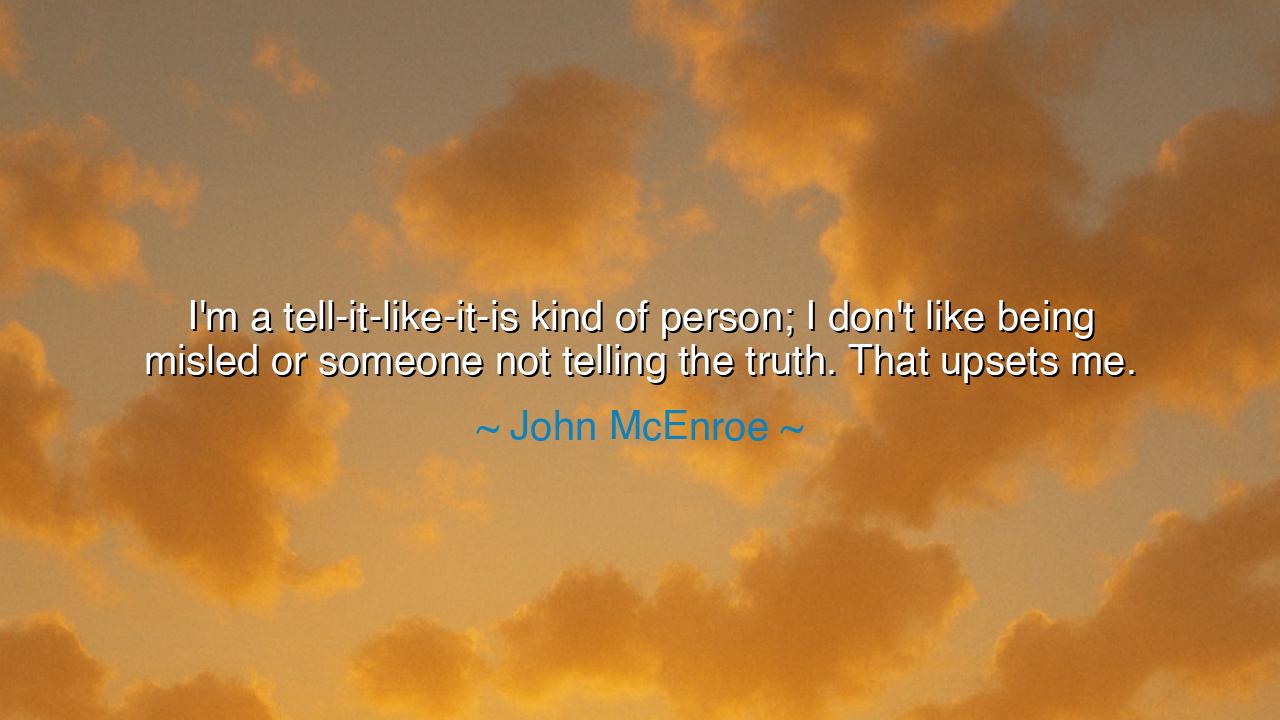
I'm a tell-it-like-it-is kind of person; I don't like being
I'm a tell-it-like-it-is kind of person; I don't like being misled or someone not telling the truth. That upsets me.






Hear the fiery words of John McEnroe, a man known not only for his mastery of the court but for his unshakable candor: “I’m a tell-it-like-it-is kind of person; I don’t like being misled or someone not telling the truth. That upsets me.” In this confession shines the spirit of one who values honesty above diplomacy, clarity above comfort. For McEnroe was never a man to veil his thoughts; his nature was to speak with force and immediacy, even when the words cut deep. He reminds us that to live with integrity is to despise deception, for truth is the foundation of all trust.
The origin of this saying is rooted in McEnroe’s own character, forged in the high-pressure crucible of competition. On the tennis court, where every call could tilt the fate of a match, he demanded fairness, precision, and above all, honesty. The slightest hint of misrepresentation enraged him, for he saw in it a violation of the sacred bond between competitors and officials. Beyond the lines of sport, his words echo a greater law: that where truth is absent, justice falters, and relationships crumble.
History bears witness to this same principle. Consider George Washington, who as a young man faced the harsh trials of war and leadership. He wrote that honesty was not only a virtue but the surest policy, for he knew that deception corrodes trust. His soldiers would not have followed him across frozen rivers had they believed him a man of lies. Like McEnroe, he understood that to be misled is more painful than defeat, and that the truth, spoken plainly, commands loyalty.
Think also of Abraham Lincoln, who was called “Honest Abe” by those who knew him. Even in his days as a lawyer, he refused to twist truth for gain, preferring to lose a case rather than betray his conscience. His legacy endures not because he pleased everyone, but because he dared to “tell it like it is,” confronting the nation with the grim reality of slavery and the cost of freedom. He embodied the very spirit McEnroe invokes: that integrity may upset, but dishonesty destroys.
The lesson, O seekers of wisdom, is this: do not fear the sharp edge of truth, for it wounds only to heal. Better to be angered by honesty than comforted by deceit. The heart that “tells it like it is” may stir conflict for a moment, but in the end it builds trust that endures. The liar may win applause today, but tomorrow his mask will crumble, and those he deceived will turn from him in contempt.
Yet hear also a caution: honesty must be wielded with courage, but also with care. To speak the truth is noble, but to speak it without compassion may harden hearts. McEnroe’s passion reminds us of the power of honesty, but wisdom teaches that honesty joined with kindness has the greatest strength. For truth is a flame: it can warm or it can scorch, depending on how it is offered.
Therefore, let your daily practice be this: speak the truth openly, but speak it with purpose, not malice. Do not mislead others, nor allow yourself to be deceived. When anger tempts you to soften or conceal, remember that deception breeds only more pain. When you must correct another, let your words be firm yet guided by goodwill. In this way, you honor both the spirit of McEnroe’s fiery candor and the deeper wisdom of the ancients.
Thus remember: “I don’t like being misled or someone not telling the truth.” Let this be your creed also. For in honesty lies freedom, in honesty lies trust, and in honesty lies the dignity of the human spirit. To tell it like it is may upset the moment, but it builds the eternal foundation upon which all noble lives must stand.






HDLuong Thi Huyen Dieu
This quote got me thinking about how much we value honesty in today’s world. It’s clear that McEnroe doesn’t tolerate dishonesty, but what about the gray areas in life? Are there times when the truth isn’t so clear-cut, and how do we navigate those moments? Can being too focused on truth sometimes make us miss the bigger picture, like the emotions and perspectives of others?
NTGia Han Nguyen Tong
I admire McEnroe’s no-nonsense approach to truth-telling, but I also wonder about the impact of always speaking bluntly. Does this approach work in every situation, or can it backfire? What happens when people feel hurt or offended by your honesty? Is the ability to tell it like it is something everyone can handle, or does it require a certain level of maturity and understanding to appreciate it?
LNHong Nhung Le Nguyen
McEnroe’s stance on truth is so clear and straightforward. But I also think it highlights a tension that many of us face: the balance between honesty and tact. While telling the truth is important, sometimes it can come across as harsh or abrasive. How do we ensure that our commitment to truth doesn’t hurt others unnecessarily? Is it possible to be both honest and empathetic at the same time?
BNTon bao ninh
I really resonate with McEnroe’s directness in this quote. It’s refreshing to hear someone say they prefer honesty, even when it’s uncomfortable. But it makes me wonder—how often do we shy away from telling the truth to avoid conflict or hurting someone’s feelings? Is it always better to tell it like it is, or are there moments when withholding the truth might be more compassionate?